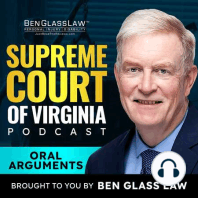32 min listen

2020 November Grayson v. Westwood Buildings | Kubli v. Westwood Buildings
2020 November Grayson v. Westwood Buildings | Kubli v. Westwood Buildings
ratings:
Length:
44 minutes
Released:
Nov 17, 2020
Format:
Podcast episode
Description
This podcast is provided by Ben Glass and Steve Emmert www.BenGlassReferrals.com - www.Virginia-Appeals.com Granted Appeal Summary Case ALAN M. GRAYSON, ET AL. v. WESTWOOD BUILDINGS LIMITED PARTNERSHIP (Record Number 191413) From The Circuit Court of Fairfax County; D. Bernhard, Judge. Counsel Bernard J. DiMuro and Michael Lieberman (DiMuro Ginsberg, PC) for appellants. Mathew D. Ravencraft and Louise T. Gitcheva (Rees Broome, PC) for appellee. Assignments of Error 1. The lower court erred as a matter of law in entering in personam judgments for “fraudulent conveyances,” “voluntary conveyances” and conversion in favor of an unsecured creditor: (a) against a senior, secured creditor with a perfected security interest who was recovering on a debt, (b) against several non-transferees who cannot be liable for conveyances they never received, and (c) against Petitioners without determining the transferors’ fraudulent intent or insolvency, all in violation of this Court’s then-recent holding in La Bella Dona Skin Care v. Belle Femme, 294 Va. 243 (2017), or otherwise contrary to the plain meaning of Va. Code §§ 55-80 & 55-81; and (d) in this context, further erred in ruling that the ‘Buy-Out Agreement’ preceding the debt lacked consideration, or that any such lack of consideration could nullify the later extension of credit or the resulting senior secured, perfected creditor status. 2. The lower court erred as a matter of law in entering a “conversion” judgment against Grayson because he was a client of a commercial transaction attorney (actually, a shareholder of that client), when that attorney simply collected on a senior, secured debt pursuant to the Uniform Commercial Code [see, e.g., Va. Code § 8.9A-205(a)] and the Executions section of Virginia Civil Remedies and Procedures (with the lower court wrongly concluding that boilerplate fieri facias language in a garnishment directed to someone else somehow compelled that attorney to refrain from such collection, and wrongly applying the tort of conversion to money to which the landlord had no exclusive and immediate right). 3. The lower court erred as a matter of law in failing to dismiss all claims against all Petitioners under res judicata, when such claims could have been brought in prior litigation regarding the same conduct, transactions and occurrences (and were actually known to the plaintiff during prior litigation), and when the prior parties were in privity to all Petitioners, in violation of this Court’s recent holding in Funny Guy, LLC v. Lecego, LLC, 293 Va. 135 (2017) and contrary to Virginia Supreme Court Rule 1:6. 4. The lower court erred as a matter of law in entering judgment against all Petitioners for fraudulent conveyances and voluntary conveyances without requiring proof by “clear, cogent and convincing evidence” from the landlord, and by shifting the burden of proof onto the defendants, in violation of this Court’s holding in Suntrust Bank v. PS Business Parks, L.P., 292 Va. 644 (2016). 5. The lower court erred as a matter of law in improperly calculating damages by: (a) awarding damages for injury that did not exist at the time of the transfers; (b) refusing to make the necessary “ratable distribution” between creditors (the landlord and Grayson/GSA); (c) refusing to honor the right under Virginia law for debtors K&A and AMG to prefer one creditor over another; (d) assessing liability for the “IDT transfers” on parties against whom the IDT transfers were not pled; and (e) awarding damages for time-barred transfers. 6. The lower court erred as a matter of law in awarding attorney’s fees and sanctions in a nonfraud case, where there is no “pattern of misconduct” of “callous, deliberate, deceitful acts,” and where the plaintiff had not elected to proceed exclusively in equity, all in violation of this Court’s recent holding in MCR Federal, LLC v. JB&A, Inc., 294 Va. 446 (2017), and contrary to the plain meaning of Va. Code § 55-82.1, especially where a
Released:
Nov 17, 2020
Format:
Podcast episode
Titles in the series (100)
February 2020 Davis v. Davis: This podcast is provided by Ben Glass and Steve Emmert - Granted Appeal Summary Case BRIAN I. DAVIS v. MERYL R. DAVIS (Record Number 180040) From The Court of Appeals of Virginia. Counsel Deborah L. McIntyre-Yurkovich (McIntyre DeFede Law... by Oral Arguments of the Supreme Court of Virginia